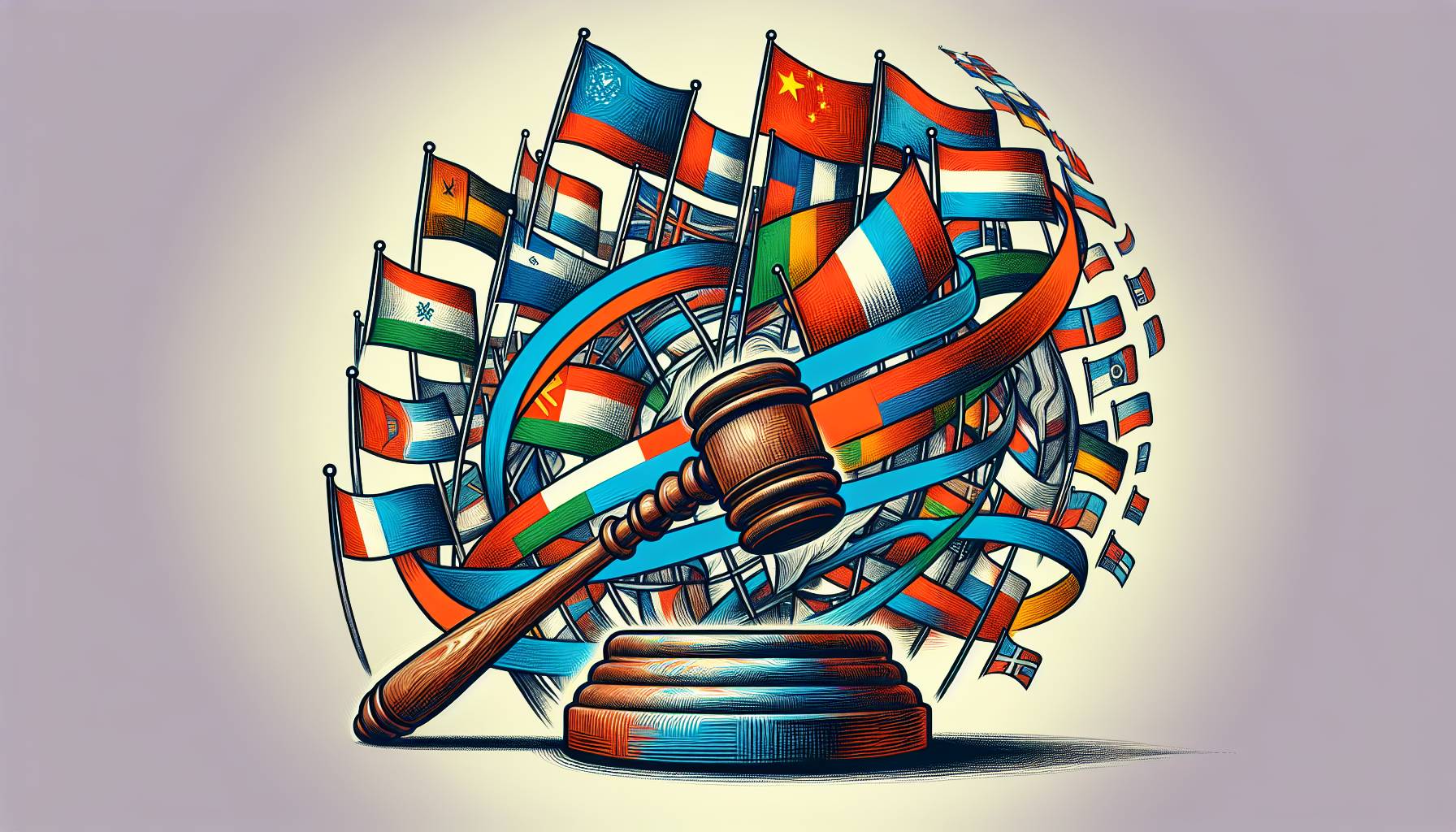Introduction
President Xi Jinping has underscored the vital need for China to establish a “harmonized and effective” legal framework for foreign relations, given the increasingly contentious relationship between the nation, the US, and its allies in areas such as trade, technology, human rights, and geopolitics. Jinping highlighted the necessity of generating favorable legal circumstances and external conditions to aid China’s revival and diplomatic endeavors, according to the state news agency Xinhua. This renewed focus on a legal framework demonstrates China’s commitment to resolving disputes and fostering cooperation with other nations in a constructive and rule-based manner. It is anticipated that this strategic approach will address global concerns, while also promoting China’s interests and reinforcing its global image as a responsible player in the international community.
Legal arsenal for foreign affairs
Beijing has been working to broaden its legal arsenal concerning foreign affairs, particularly in reaction to sanctions. Huang Huikang, an international law expert, diplomat, and former ambassador to Malaysia, recently discussed this topic during a study session. In his discussion, Huang emphasized the importance of developing a robust legal framework to counteract unilateral sanctions and protect China’s national interests on the global stage. Additionally, he highlighted the need for the country to actively engage in international cooperation and uphold the principles of international law, in order to preserve its sovereignty and maintain a stable global environment.
Reforming the trial system
Jinping emphasized the significance of reforming the trial system, increasing the trustworthiness of the legal procedure, and enhancing legal services, including “globally recognized” arbitration institutions and law firms. These efforts in the legal system will not only establish a stronger foundation for the country’s ongoing development but also attract international investors and businesses. By promoting transparency, efficiency, and reliability within the judiciary, China aims to demonstrate its commitment to upholding the rule of law and fostering a fair business environment.
Cultivating legal experts in foreign affairs
Furthermore, Jinping stressed the importance of cultivating “politically resolute and highly competent” legal experts in foreign affairs. These legal experts would be responsible for effectively safeguarding China’s national interests and promoting international cooperation, by understanding and navigating complex international laws and conventions. In doing so, they would contribute to building a brighter, more harmonious global community, in line with China’s diplomatic goals.
Proactive involvement in international rule-making
Additionally, he urged proactive involvement in international rule-making, positioning China as a powerful player in worldwide governance. This move highlights China’s ambition to not only be a part of global decision-making but also to actively shape international norms and policies. By actively participating in international rule-making, China aims to ensure that its interests are represented, while also projecting its growing influence on the global stage.
Protecting Chinese citizens abroad
Strengthening the legal system to safeguard the interests of Chinese citizens abroad through international collaboration and improved consular protection was also identified as a high priority. This focus on increased protection and advocacy for Chinese citizens comes as a response to the growing population of Chinese travelers and expatriates who are seeking opportunities and experiences around the world. Furthermore, such measures highlight the Chinese government’s commitment to providing security and support to its citizens beyond its borders.
Enhanced foreign policy legislation
Faced with a challenging global context, Beijing has implemented additional foreign policy legislation in recent years. Among these measures, China seeks to strengthen its relationships with political and economic partners around the world. By pursuing strategic alliances and enhancing diplomacy efforts, Beijing aims to create a more favorable international standing in an ever-evolving global stage.
New Foreign Relations Law
A new Foreign Relations Law, which came into force in July, concentrates on national security and combating the supposed “long-arm jurisdiction” of the US and other countries. This legislation aims to counteract extraterritorial encroachments by foreign governments, specifically focusing on providing a legal framework that safeguards China’s sovereignty and interests. It also establishes a coordinated approach to address challenging international situations, bolstering the country’s capability to respond to potential threats imposed by external forces.
Response to Western sanctions
This step reinforces Beijing’s response to sanctions imposed by Western nations. The move highlights China’s determination to counteract the economic and political pressures exerted by Western countries. It also underscores the growing divide between China and these nations, as both sides continue to engage in a tit-for-tat approach in addressing their respective concerns.
First Reported on: scmp.com
FAQ Section
Why does China need a “harmonized and effective” legal framework for foreign relations?
Given the increasingly contentious relationship between China, the US, and its allies in areas such as trade, technology, human rights, and geopolitics, a harmonized and effective legal framework is essential for resolving disputes and fostering cooperation in a constructive and rule-based manner. It will help generate favorable legal circumstances and external conditions to support China’s revival and diplomatic endeavors.
What is the significance of reforming the trial system?
Reforming the trial system, increasing trustworthiness in the legal procedure, and enhancing legal services, including globally recognized arbitration institutions and law firms, will not only establish a stronger foundation for China’s ongoing development but also attract international investors and businesses. Promoting transparency, efficiency, and reliability in the judiciary demonstrates China’s commitment to upholding the rule of law and fostering a fair business environment.
Why is it important to cultivate legal experts in foreign affairs?
Politically resolute and highly competent legal experts in foreign affairs will be responsible for effectively safeguarding China’s national interests and promoting international cooperation by understanding and navigating complex international laws and conventions. They will contribute to building a brighter, more harmonious global community, in line with China’s diplomatic goals.
What is the purpose of China’s proactive involvement in international rule-making?
Proactive involvement in international rule-making allows China to position itself as a powerful player in global governance, enabling it to actively shape international norms and policies. This approach ensures that China’s interests are represented and projects its growing influence on the global stage.
How do the legal system reforms aim to protect Chinese citizens abroad?
Strengthening the legal system to safeguard the interests of Chinese citizens abroad through international collaboration and improved consular protection is a high priority. It is a response to the growing population of Chinese travelers and expatriates who seek opportunities and experiences around the world. These measures also demonstrate the Chinese government’s commitment to providing security and support to its citizens beyond its borders.
What is the goal of China’s enhanced foreign policy legislation?
The goal is to strengthen relationships with political and economic partners worldwide and create a more favorable international standing in an ever-evolving global stage. This approach involves pursuing strategic alliances and enhancing diplomacy efforts to navigate a challenging global context.
How does the new Foreign Relations Law address external pressures from other countries?
The new Foreign Relations Law, which came into force in July, concentrates on national security and combating the supposed “long-arm jurisdiction” of the US and other countries. This legislation counters extraterritorial encroachments by foreign governments and provides a legal framework that safeguards China’s sovereignty and interests. It establishes a coordinated approach to address challenging international situations, bolstering China’s capability to respond to potential threats imposed by external forces.
What is the significance of China’s response to Western sanctions?
China’s response to Western sanctions reinforces its determination to counteract the economic and political pressures exerted by Western countries. It underscores the growing divide between China and these nations as they continue to engage in a tit-for-tat approach in addressing their respective concerns.













